Comparing Internal Managers and External Business Consultants Project
VerifiedAdded on 2023/02/01
|8
|2256
|39
Report
AI Summary
This report provides a detailed comparison of the roles of internal managers and external business consultants in business projects. It explores their similarities, such as offering guidance and expertise in organizational development, and their differences, including cost, independence, and knowledge of the organization. The report analyzes the advantages and disadvantages of each, considering factors like trust, technical expertise, and the ability to implement changes. It also examines the benefits of external consultants, such as their broader perspective and specialized skills, and the advantages of internal managers, such as their familiarity with the company culture and lower cost. The report emphasizes the importance of understanding these roles for effective project management and organizational success, supported by relevant academic references.

Running head: BUSINESS PROJECT 1
Business project
Student’s name
Professor’s name
Institutional affiliation
Date
Business project
Student’s name
Professor’s name
Institutional affiliation
Date
Paraphrase This Document
Need a fresh take? Get an instant paraphrase of this document with our AI Paraphraser
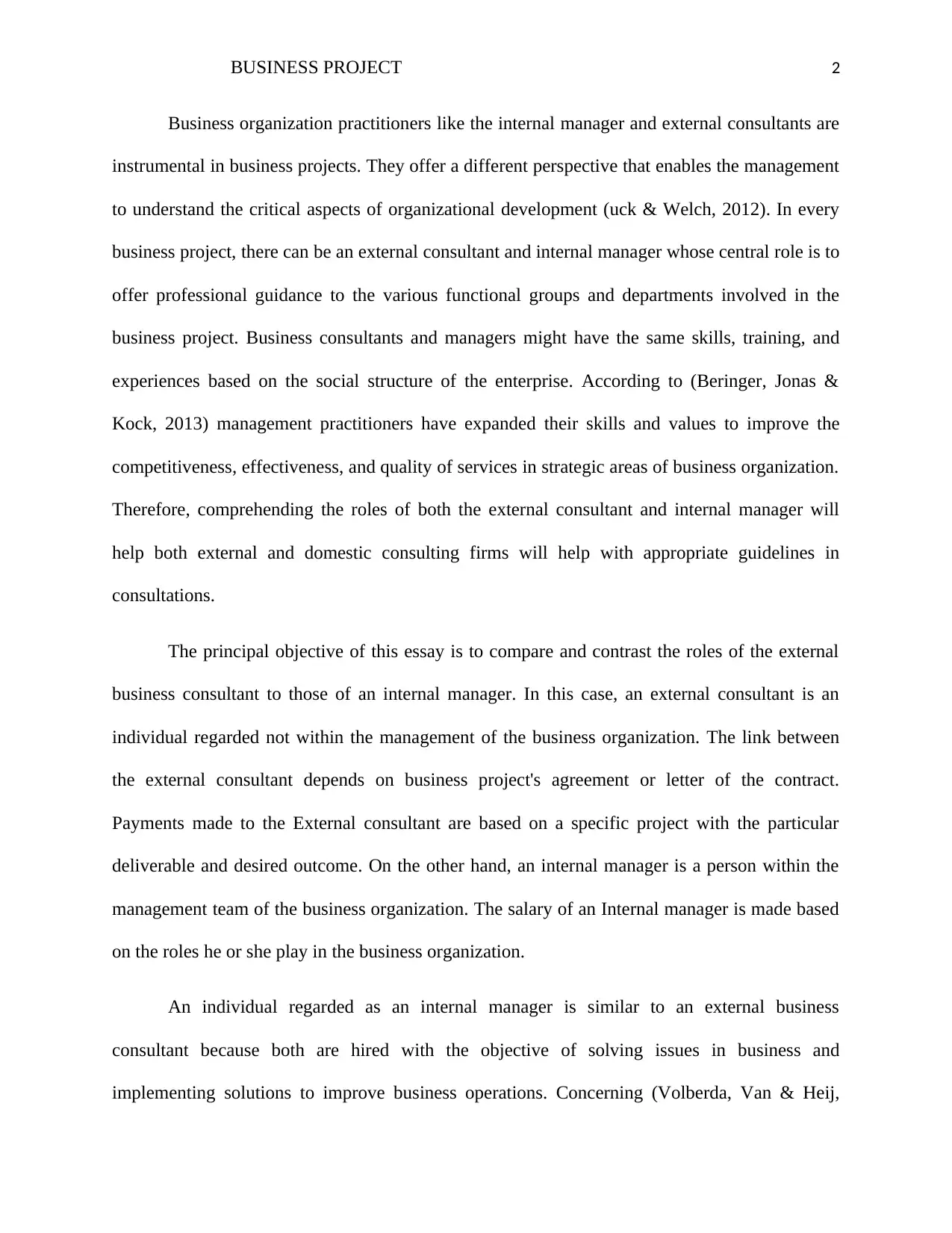
BUSINESS PROJECT 2
Business organization practitioners like the internal manager and external consultants are
instrumental in business projects. They offer a different perspective that enables the management
to understand the critical aspects of organizational development (uck & Welch, 2012). In every
business project, there can be an external consultant and internal manager whose central role is to
offer professional guidance to the various functional groups and departments involved in the
business project. Business consultants and managers might have the same skills, training, and
experiences based on the social structure of the enterprise. According to (Beringer, Jonas &
Kock, 2013) management practitioners have expanded their skills and values to improve the
competitiveness, effectiveness, and quality of services in strategic areas of business organization.
Therefore, comprehending the roles of both the external consultant and internal manager will
help both external and domestic consulting firms will help with appropriate guidelines in
consultations.
The principal objective of this essay is to compare and contrast the roles of the external
business consultant to those of an internal manager. In this case, an external consultant is an
individual regarded not within the management of the business organization. The link between
the external consultant depends on business project's agreement or letter of the contract.
Payments made to the External consultant are based on a specific project with the particular
deliverable and desired outcome. On the other hand, an internal manager is a person within the
management team of the business organization. The salary of an Internal manager is made based
on the roles he or she play in the business organization.
An individual regarded as an internal manager is similar to an external business
consultant because both are hired with the objective of solving issues in business and
implementing solutions to improve business operations. Concerning (Volberda, Van & Heij,
Business organization practitioners like the internal manager and external consultants are
instrumental in business projects. They offer a different perspective that enables the management
to understand the critical aspects of organizational development (uck & Welch, 2012). In every
business project, there can be an external consultant and internal manager whose central role is to
offer professional guidance to the various functional groups and departments involved in the
business project. Business consultants and managers might have the same skills, training, and
experiences based on the social structure of the enterprise. According to (Beringer, Jonas &
Kock, 2013) management practitioners have expanded their skills and values to improve the
competitiveness, effectiveness, and quality of services in strategic areas of business organization.
Therefore, comprehending the roles of both the external consultant and internal manager will
help both external and domestic consulting firms will help with appropriate guidelines in
consultations.
The principal objective of this essay is to compare and contrast the roles of the external
business consultant to those of an internal manager. In this case, an external consultant is an
individual regarded not within the management of the business organization. The link between
the external consultant depends on business project's agreement or letter of the contract.
Payments made to the External consultant are based on a specific project with the particular
deliverable and desired outcome. On the other hand, an internal manager is a person within the
management team of the business organization. The salary of an Internal manager is made based
on the roles he or she play in the business organization.
An individual regarded as an internal manager is similar to an external business
consultant because both are hired with the objective of solving issues in business and
implementing solutions to improve business operations. Concerning (Volberda, Van & Heij,
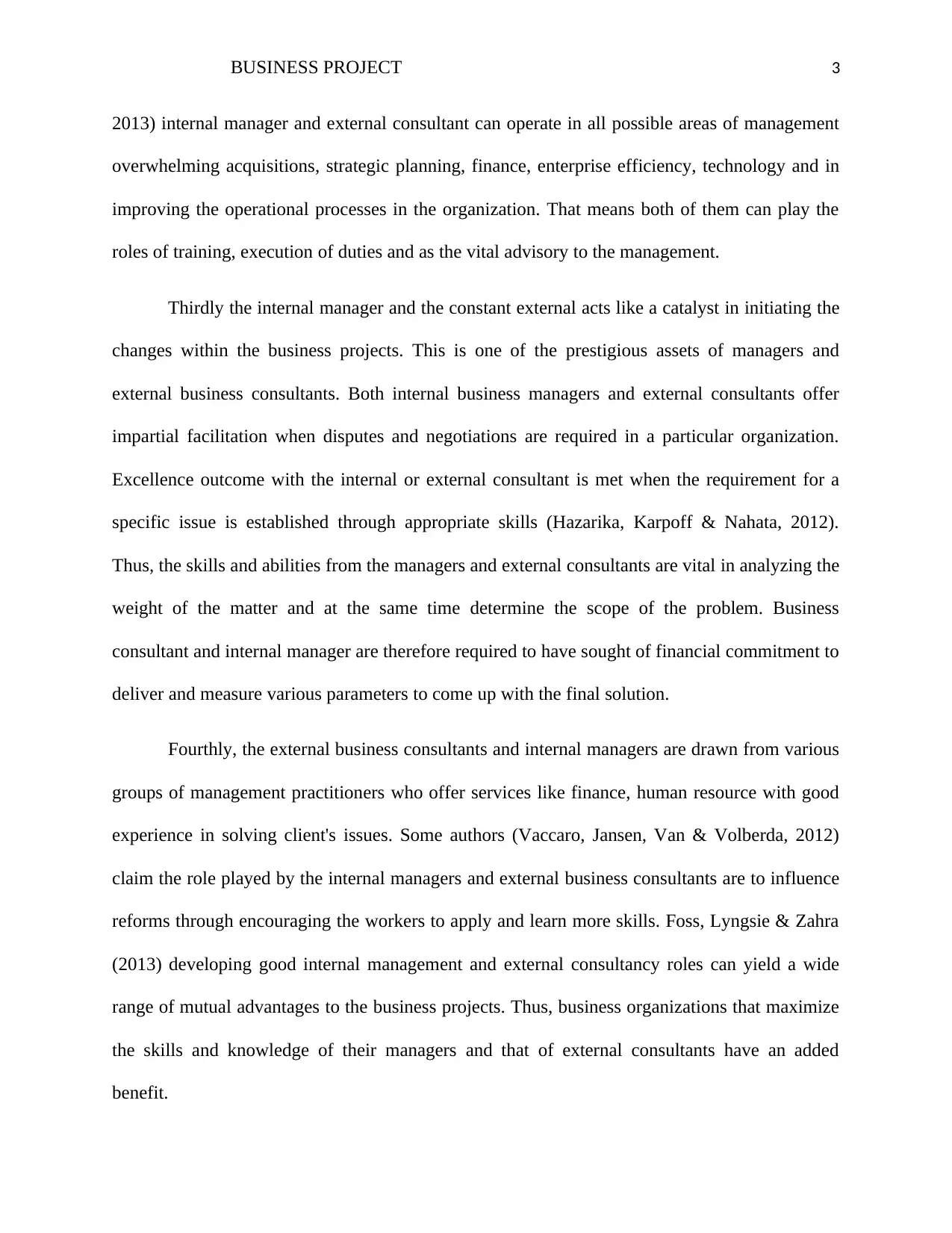
BUSINESS PROJECT 3
2013) internal manager and external consultant can operate in all possible areas of management
overwhelming acquisitions, strategic planning, finance, enterprise efficiency, technology and in
improving the operational processes in the organization. That means both of them can play the
roles of training, execution of duties and as the vital advisory to the management.
Thirdly the internal manager and the constant external acts like a catalyst in initiating the
changes within the business projects. This is one of the prestigious assets of managers and
external business consultants. Both internal business managers and external consultants offer
impartial facilitation when disputes and negotiations are required in a particular organization.
Excellence outcome with the internal or external consultant is met when the requirement for a
specific issue is established through appropriate skills (Hazarika, Karpoff & Nahata, 2012).
Thus, the skills and abilities from the managers and external consultants are vital in analyzing the
weight of the matter and at the same time determine the scope of the problem. Business
consultant and internal manager are therefore required to have sought of financial commitment to
deliver and measure various parameters to come up with the final solution.
Fourthly, the external business consultants and internal managers are drawn from various
groups of management practitioners who offer services like finance, human resource with good
experience in solving client's issues. Some authors (Vaccaro, Jansen, Van & Volberda, 2012)
claim the role played by the internal managers and external business consultants are to influence
reforms through encouraging the workers to apply and learn more skills. Foss, Lyngsie & Zahra
(2013) developing good internal management and external consultancy roles can yield a wide
range of mutual advantages to the business projects. Thus, business organizations that maximize
the skills and knowledge of their managers and that of external consultants have an added
benefit.
2013) internal manager and external consultant can operate in all possible areas of management
overwhelming acquisitions, strategic planning, finance, enterprise efficiency, technology and in
improving the operational processes in the organization. That means both of them can play the
roles of training, execution of duties and as the vital advisory to the management.
Thirdly the internal manager and the constant external acts like a catalyst in initiating the
changes within the business projects. This is one of the prestigious assets of managers and
external business consultants. Both internal business managers and external consultants offer
impartial facilitation when disputes and negotiations are required in a particular organization.
Excellence outcome with the internal or external consultant is met when the requirement for a
specific issue is established through appropriate skills (Hazarika, Karpoff & Nahata, 2012).
Thus, the skills and abilities from the managers and external consultants are vital in analyzing the
weight of the matter and at the same time determine the scope of the problem. Business
consultant and internal manager are therefore required to have sought of financial commitment to
deliver and measure various parameters to come up with the final solution.
Fourthly, the external business consultants and internal managers are drawn from various
groups of management practitioners who offer services like finance, human resource with good
experience in solving client's issues. Some authors (Vaccaro, Jansen, Van & Volberda, 2012)
claim the role played by the internal managers and external business consultants are to influence
reforms through encouraging the workers to apply and learn more skills. Foss, Lyngsie & Zahra
(2013) developing good internal management and external consultancy roles can yield a wide
range of mutual advantages to the business projects. Thus, business organizations that maximize
the skills and knowledge of their managers and that of external consultants have an added
benefit.
⊘ This is a preview!⊘
Do you want full access?
Subscribe today to unlock all pages.

Trusted by 1+ million students worldwide
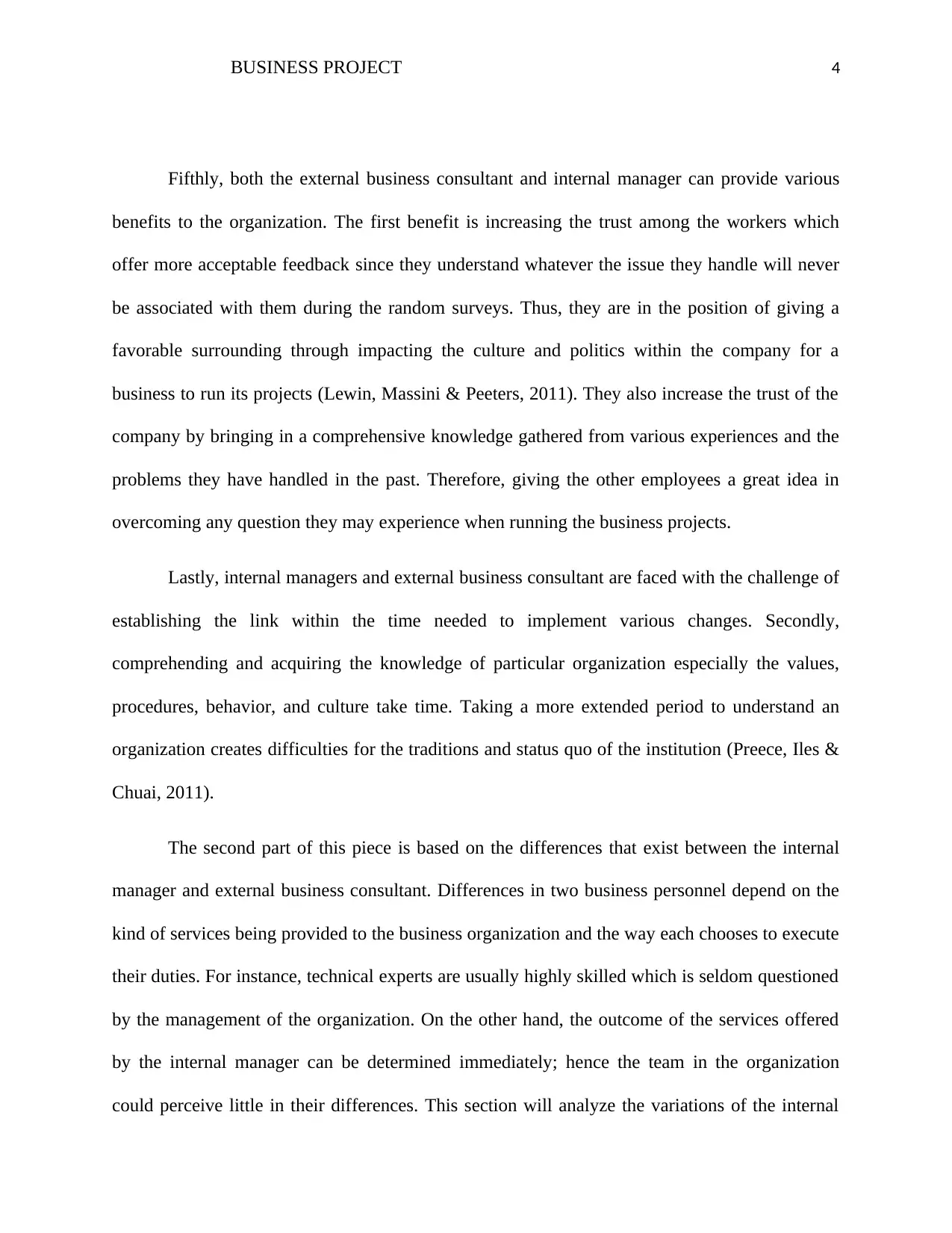
BUSINESS PROJECT 4
Fifthly, both the external business consultant and internal manager can provide various
benefits to the organization. The first benefit is increasing the trust among the workers which
offer more acceptable feedback since they understand whatever the issue they handle will never
be associated with them during the random surveys. Thus, they are in the position of giving a
favorable surrounding through impacting the culture and politics within the company for a
business to run its projects (Lewin, Massini & Peeters, 2011). They also increase the trust of the
company by bringing in a comprehensive knowledge gathered from various experiences and the
problems they have handled in the past. Therefore, giving the other employees a great idea in
overcoming any question they may experience when running the business projects.
Lastly, internal managers and external business consultant are faced with the challenge of
establishing the link within the time needed to implement various changes. Secondly,
comprehending and acquiring the knowledge of particular organization especially the values,
procedures, behavior, and culture take time. Taking a more extended period to understand an
organization creates difficulties for the traditions and status quo of the institution (Preece, Iles &
Chuai, 2011).
The second part of this piece is based on the differences that exist between the internal
manager and external business consultant. Differences in two business personnel depend on the
kind of services being provided to the business organization and the way each chooses to execute
their duties. For instance, technical experts are usually highly skilled which is seldom questioned
by the management of the organization. On the other hand, the outcome of the services offered
by the internal manager can be determined immediately; hence the team in the organization
could perceive little in their differences. This section will analyze the variations of the internal
Fifthly, both the external business consultant and internal manager can provide various
benefits to the organization. The first benefit is increasing the trust among the workers which
offer more acceptable feedback since they understand whatever the issue they handle will never
be associated with them during the random surveys. Thus, they are in the position of giving a
favorable surrounding through impacting the culture and politics within the company for a
business to run its projects (Lewin, Massini & Peeters, 2011). They also increase the trust of the
company by bringing in a comprehensive knowledge gathered from various experiences and the
problems they have handled in the past. Therefore, giving the other employees a great idea in
overcoming any question they may experience when running the business projects.
Lastly, internal managers and external business consultant are faced with the challenge of
establishing the link within the time needed to implement various changes. Secondly,
comprehending and acquiring the knowledge of particular organization especially the values,
procedures, behavior, and culture take time. Taking a more extended period to understand an
organization creates difficulties for the traditions and status quo of the institution (Preece, Iles &
Chuai, 2011).
The second part of this piece is based on the differences that exist between the internal
manager and external business consultant. Differences in two business personnel depend on the
kind of services being provided to the business organization and the way each chooses to execute
their duties. For instance, technical experts are usually highly skilled which is seldom questioned
by the management of the organization. On the other hand, the outcome of the services offered
by the internal manager can be determined immediately; hence the team in the organization
could perceive little in their differences. This section will analyze the variations of the internal
Paraphrase This Document
Need a fresh take? Get an instant paraphrase of this document with our AI Paraphraser
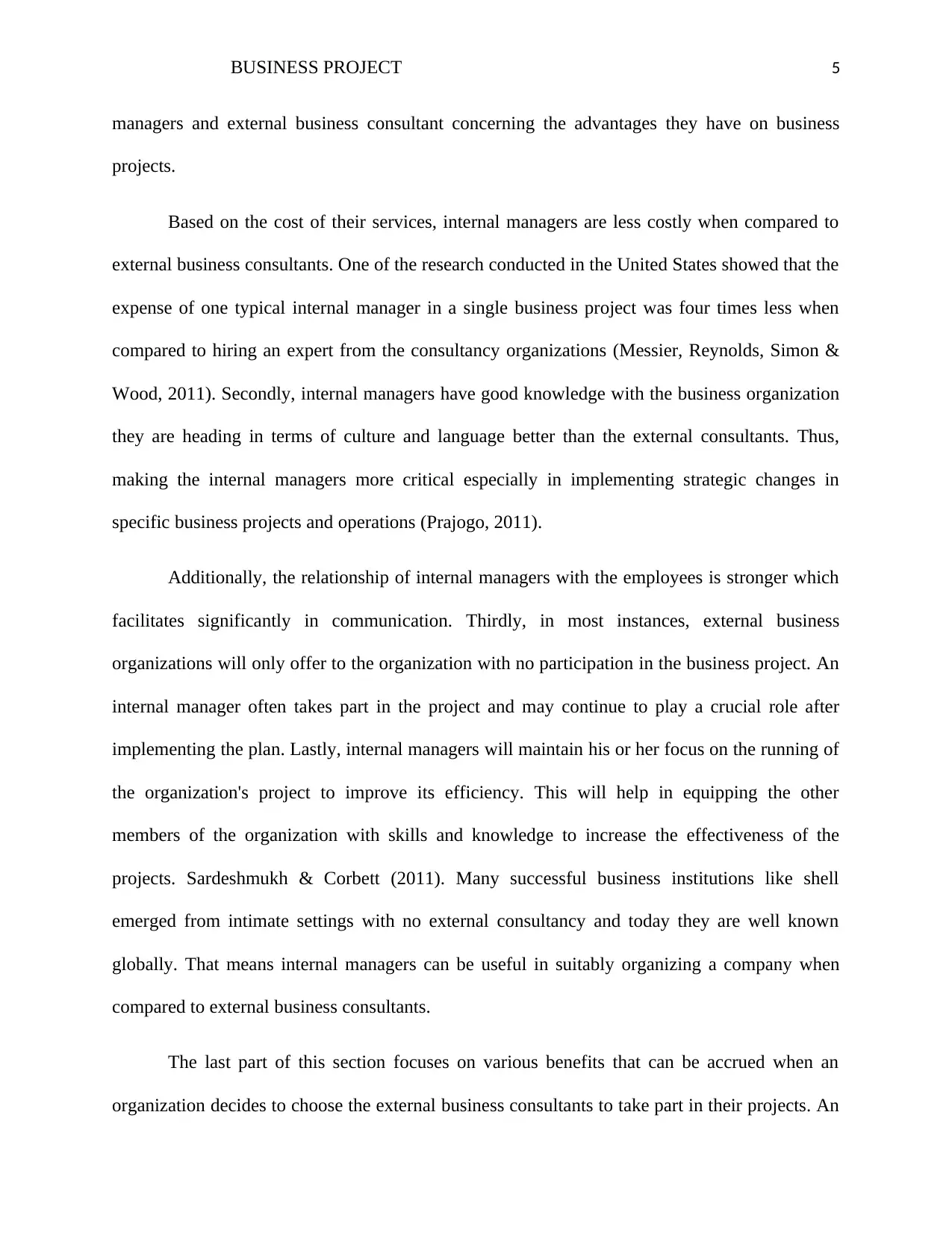
BUSINESS PROJECT 5
managers and external business consultant concerning the advantages they have on business
projects.
Based on the cost of their services, internal managers are less costly when compared to
external business consultants. One of the research conducted in the United States showed that the
expense of one typical internal manager in a single business project was four times less when
compared to hiring an expert from the consultancy organizations (Messier, Reynolds, Simon &
Wood, 2011). Secondly, internal managers have good knowledge with the business organization
they are heading in terms of culture and language better than the external consultants. Thus,
making the internal managers more critical especially in implementing strategic changes in
specific business projects and operations (Prajogo, 2011).
Additionally, the relationship of internal managers with the employees is stronger which
facilitates significantly in communication. Thirdly, in most instances, external business
organizations will only offer to the organization with no participation in the business project. An
internal manager often takes part in the project and may continue to play a crucial role after
implementing the plan. Lastly, internal managers will maintain his or her focus on the running of
the organization's project to improve its efficiency. This will help in equipping the other
members of the organization with skills and knowledge to increase the effectiveness of the
projects. Sardeshmukh & Corbett (2011). Many successful business institutions like shell
emerged from intimate settings with no external consultancy and today they are well known
globally. That means internal managers can be useful in suitably organizing a company when
compared to external business consultants.
The last part of this section focuses on various benefits that can be accrued when an
organization decides to choose the external business consultants to take part in their projects. An
managers and external business consultant concerning the advantages they have on business
projects.
Based on the cost of their services, internal managers are less costly when compared to
external business consultants. One of the research conducted in the United States showed that the
expense of one typical internal manager in a single business project was four times less when
compared to hiring an expert from the consultancy organizations (Messier, Reynolds, Simon &
Wood, 2011). Secondly, internal managers have good knowledge with the business organization
they are heading in terms of culture and language better than the external consultants. Thus,
making the internal managers more critical especially in implementing strategic changes in
specific business projects and operations (Prajogo, 2011).
Additionally, the relationship of internal managers with the employees is stronger which
facilitates significantly in communication. Thirdly, in most instances, external business
organizations will only offer to the organization with no participation in the business project. An
internal manager often takes part in the project and may continue to play a crucial role after
implementing the plan. Lastly, internal managers will maintain his or her focus on the running of
the organization's project to improve its efficiency. This will help in equipping the other
members of the organization with skills and knowledge to increase the effectiveness of the
projects. Sardeshmukh & Corbett (2011). Many successful business institutions like shell
emerged from intimate settings with no external consultancy and today they are well known
globally. That means internal managers can be useful in suitably organizing a company when
compared to external business consultants.
The last part of this section focuses on various benefits that can be accrued when an
organization decides to choose the external business consultants to take part in their projects. An
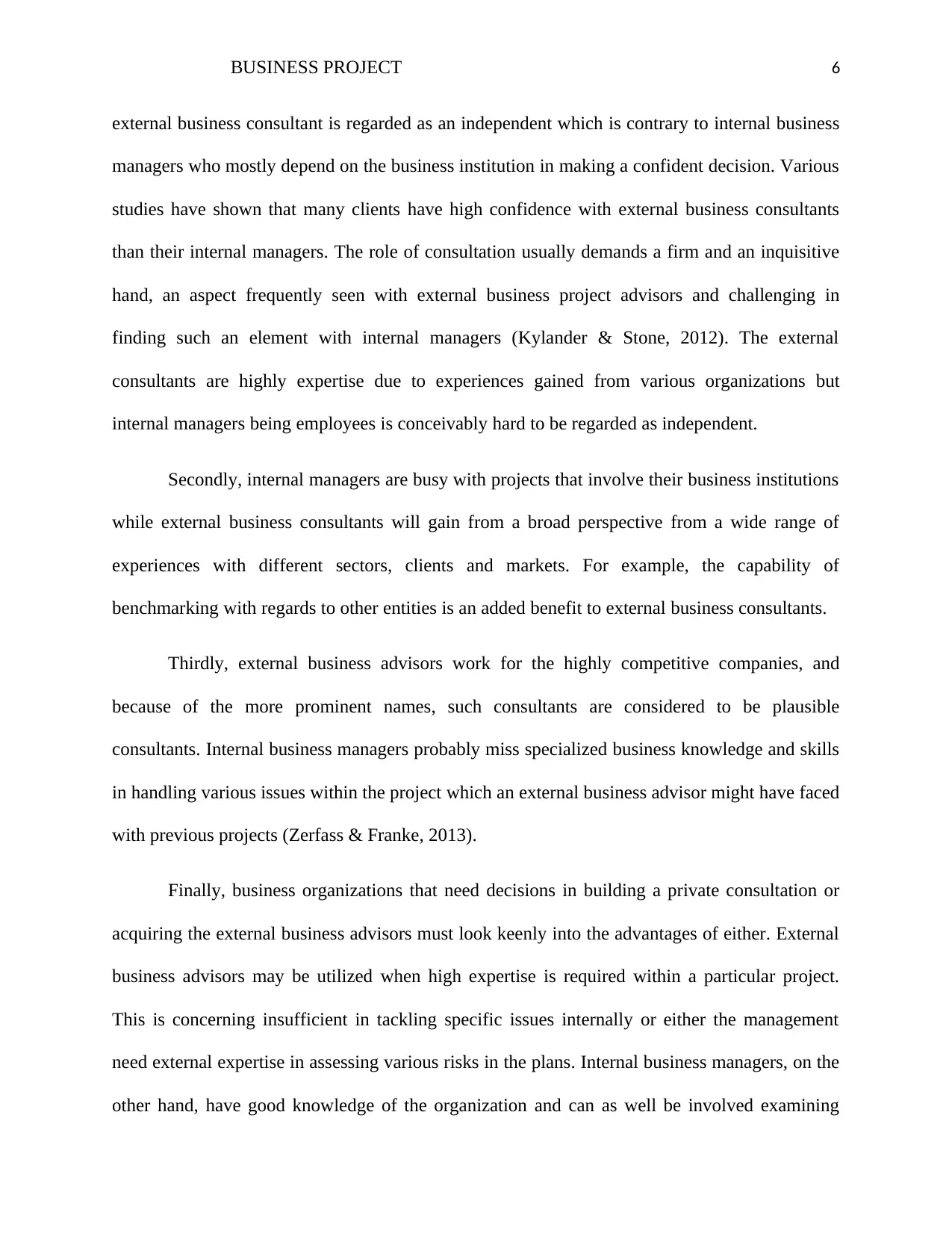
BUSINESS PROJECT 6
external business consultant is regarded as an independent which is contrary to internal business
managers who mostly depend on the business institution in making a confident decision. Various
studies have shown that many clients have high confidence with external business consultants
than their internal managers. The role of consultation usually demands a firm and an inquisitive
hand, an aspect frequently seen with external business project advisors and challenging in
finding such an element with internal managers (Kylander & Stone, 2012). The external
consultants are highly expertise due to experiences gained from various organizations but
internal managers being employees is conceivably hard to be regarded as independent.
Secondly, internal managers are busy with projects that involve their business institutions
while external business consultants will gain from a broad perspective from a wide range of
experiences with different sectors, clients and markets. For example, the capability of
benchmarking with regards to other entities is an added benefit to external business consultants.
Thirdly, external business advisors work for the highly competitive companies, and
because of the more prominent names, such consultants are considered to be plausible
consultants. Internal business managers probably miss specialized business knowledge and skills
in handling various issues within the project which an external business advisor might have faced
with previous projects (Zerfass & Franke, 2013).
Finally, business organizations that need decisions in building a private consultation or
acquiring the external business advisors must look keenly into the advantages of either. External
business advisors may be utilized when high expertise is required within a particular project.
This is concerning insufficient in tackling specific issues internally or either the management
need external expertise in assessing various risks in the plans. Internal business managers, on the
other hand, have good knowledge of the organization and can as well be involved examining
external business consultant is regarded as an independent which is contrary to internal business
managers who mostly depend on the business institution in making a confident decision. Various
studies have shown that many clients have high confidence with external business consultants
than their internal managers. The role of consultation usually demands a firm and an inquisitive
hand, an aspect frequently seen with external business project advisors and challenging in
finding such an element with internal managers (Kylander & Stone, 2012). The external
consultants are highly expertise due to experiences gained from various organizations but
internal managers being employees is conceivably hard to be regarded as independent.
Secondly, internal managers are busy with projects that involve their business institutions
while external business consultants will gain from a broad perspective from a wide range of
experiences with different sectors, clients and markets. For example, the capability of
benchmarking with regards to other entities is an added benefit to external business consultants.
Thirdly, external business advisors work for the highly competitive companies, and
because of the more prominent names, such consultants are considered to be plausible
consultants. Internal business managers probably miss specialized business knowledge and skills
in handling various issues within the project which an external business advisor might have faced
with previous projects (Zerfass & Franke, 2013).
Finally, business organizations that need decisions in building a private consultation or
acquiring the external business advisors must look keenly into the advantages of either. External
business advisors may be utilized when high expertise is required within a particular project.
This is concerning insufficient in tackling specific issues internally or either the management
need external expertise in assessing various risks in the plans. Internal business managers, on the
other hand, have good knowledge of the organization and can as well be involved examining
⊘ This is a preview!⊘
Do you want full access?
Subscribe today to unlock all pages.

Trusted by 1+ million students worldwide
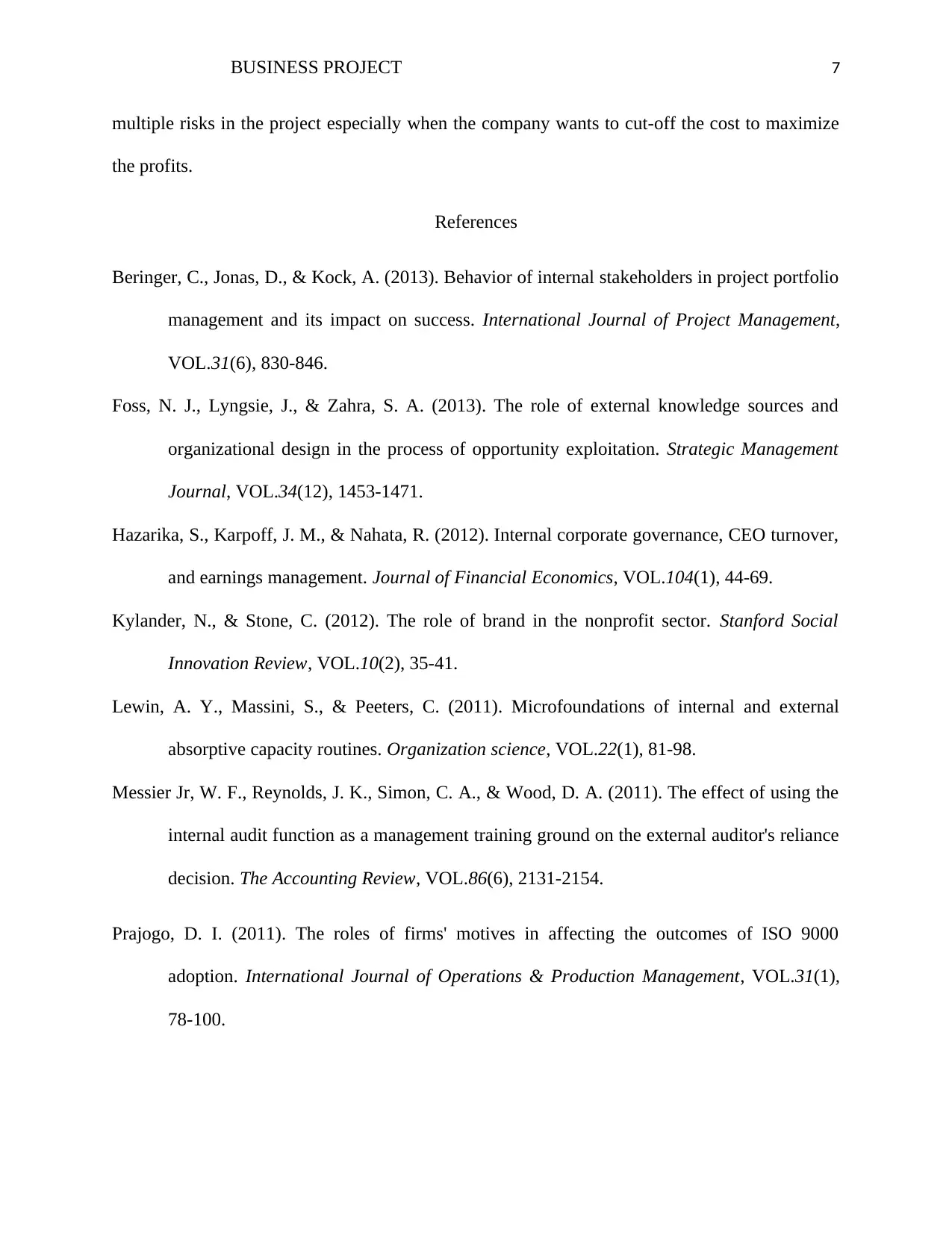
BUSINESS PROJECT 7
multiple risks in the project especially when the company wants to cut-off the cost to maximize
the profits.
References
Beringer, C., Jonas, D., & Kock, A. (2013). Behavior of internal stakeholders in project portfolio
management and its impact on success. International Journal of Project Management,
VOL.31(6), 830-846.
Foss, N. J., Lyngsie, J., & Zahra, S. A. (2013). The role of external knowledge sources and
organizational design in the process of opportunity exploitation. Strategic Management
Journal, VOL.34(12), 1453-1471.
Hazarika, S., Karpoff, J. M., & Nahata, R. (2012). Internal corporate governance, CEO turnover,
and earnings management. Journal of Financial Economics, VOL.104(1), 44-69.
Kylander, N., & Stone, C. (2012). The role of brand in the nonprofit sector. Stanford Social
Innovation Review, VOL.10(2), 35-41.
Lewin, A. Y., Massini, S., & Peeters, C. (2011). Microfoundations of internal and external
absorptive capacity routines. Organization science, VOL.22(1), 81-98.
Messier Jr, W. F., Reynolds, J. K., Simon, C. A., & Wood, D. A. (2011). The effect of using the
internal audit function as a management training ground on the external auditor's reliance
decision. The Accounting Review, VOL.86(6), 2131-2154.
Prajogo, D. I. (2011). The roles of firms' motives in affecting the outcomes of ISO 9000
adoption. International Journal of Operations & Production Management, VOL.31(1),
78-100.
multiple risks in the project especially when the company wants to cut-off the cost to maximize
the profits.
References
Beringer, C., Jonas, D., & Kock, A. (2013). Behavior of internal stakeholders in project portfolio
management and its impact on success. International Journal of Project Management,
VOL.31(6), 830-846.
Foss, N. J., Lyngsie, J., & Zahra, S. A. (2013). The role of external knowledge sources and
organizational design in the process of opportunity exploitation. Strategic Management
Journal, VOL.34(12), 1453-1471.
Hazarika, S., Karpoff, J. M., & Nahata, R. (2012). Internal corporate governance, CEO turnover,
and earnings management. Journal of Financial Economics, VOL.104(1), 44-69.
Kylander, N., & Stone, C. (2012). The role of brand in the nonprofit sector. Stanford Social
Innovation Review, VOL.10(2), 35-41.
Lewin, A. Y., Massini, S., & Peeters, C. (2011). Microfoundations of internal and external
absorptive capacity routines. Organization science, VOL.22(1), 81-98.
Messier Jr, W. F., Reynolds, J. K., Simon, C. A., & Wood, D. A. (2011). The effect of using the
internal audit function as a management training ground on the external auditor's reliance
decision. The Accounting Review, VOL.86(6), 2131-2154.
Prajogo, D. I. (2011). The roles of firms' motives in affecting the outcomes of ISO 9000
adoption. International Journal of Operations & Production Management, VOL.31(1),
78-100.
Paraphrase This Document
Need a fresh take? Get an instant paraphrase of this document with our AI Paraphraser
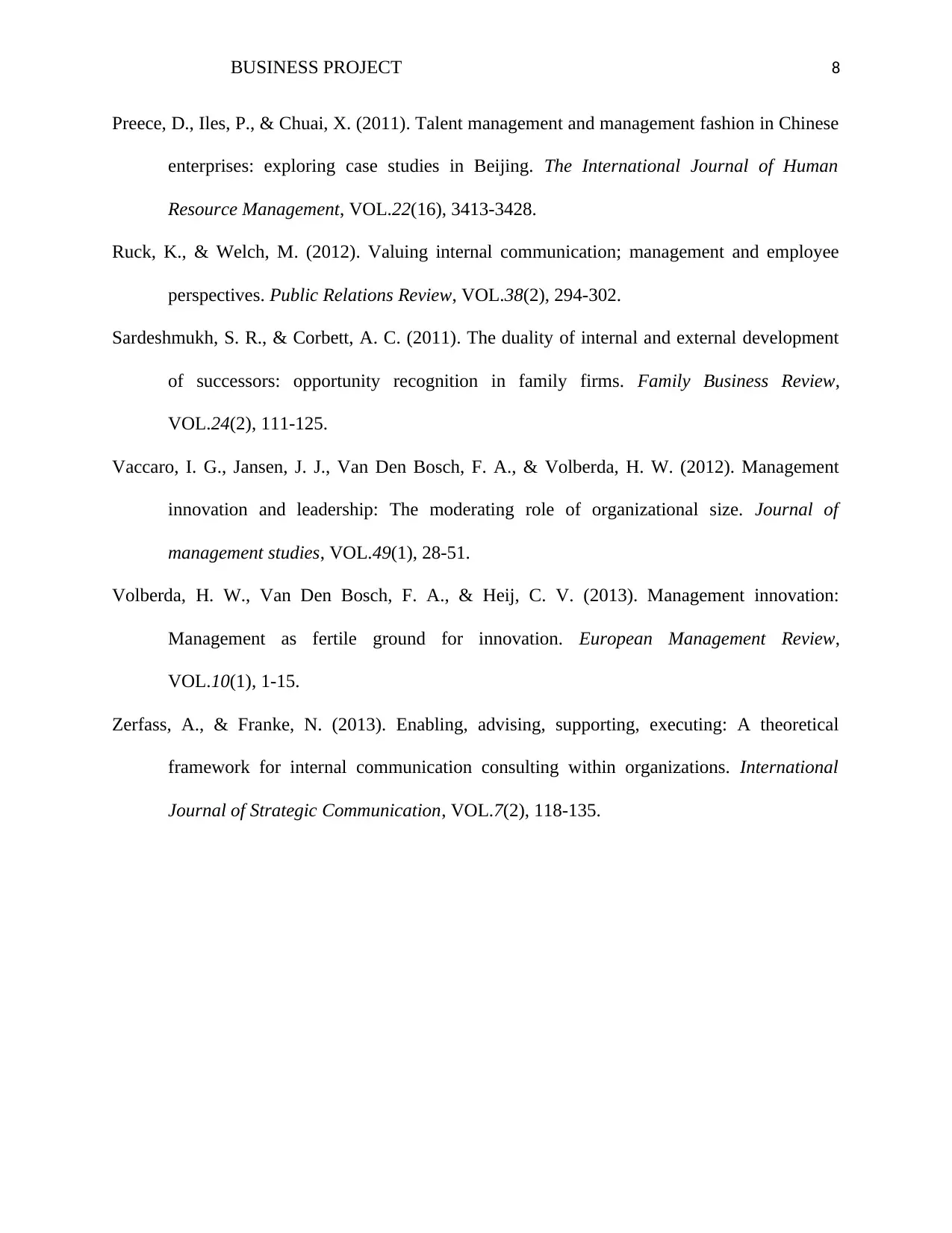
BUSINESS PROJECT 8
Preece, D., Iles, P., & Chuai, X. (2011). Talent management and management fashion in Chinese
enterprises: exploring case studies in Beijing. The International Journal of Human
Resource Management, VOL.22(16), 3413-3428.
Ruck, K., & Welch, M. (2012). Valuing internal communication; management and employee
perspectives. Public Relations Review, VOL.38(2), 294-302.
Sardeshmukh, S. R., & Corbett, A. C. (2011). The duality of internal and external development
of successors: opportunity recognition in family firms. Family Business Review,
VOL.24(2), 111-125.
Vaccaro, I. G., Jansen, J. J., Van Den Bosch, F. A., & Volberda, H. W. (2012). Management
innovation and leadership: The moderating role of organizational size. Journal of
management studies, VOL.49(1), 28-51.
Volberda, H. W., Van Den Bosch, F. A., & Heij, C. V. (2013). Management innovation:
Management as fertile ground for innovation. European Management Review,
VOL.10(1), 1-15.
Zerfass, A., & Franke, N. (2013). Enabling, advising, supporting, executing: A theoretical
framework for internal communication consulting within organizations. International
Journal of Strategic Communication, VOL.7(2), 118-135.
Preece, D., Iles, P., & Chuai, X. (2011). Talent management and management fashion in Chinese
enterprises: exploring case studies in Beijing. The International Journal of Human
Resource Management, VOL.22(16), 3413-3428.
Ruck, K., & Welch, M. (2012). Valuing internal communication; management and employee
perspectives. Public Relations Review, VOL.38(2), 294-302.
Sardeshmukh, S. R., & Corbett, A. C. (2011). The duality of internal and external development
of successors: opportunity recognition in family firms. Family Business Review,
VOL.24(2), 111-125.
Vaccaro, I. G., Jansen, J. J., Van Den Bosch, F. A., & Volberda, H. W. (2012). Management
innovation and leadership: The moderating role of organizational size. Journal of
management studies, VOL.49(1), 28-51.
Volberda, H. W., Van Den Bosch, F. A., & Heij, C. V. (2013). Management innovation:
Management as fertile ground for innovation. European Management Review,
VOL.10(1), 1-15.
Zerfass, A., & Franke, N. (2013). Enabling, advising, supporting, executing: A theoretical
framework for internal communication consulting within organizations. International
Journal of Strategic Communication, VOL.7(2), 118-135.
1 out of 8
Related Documents
Your All-in-One AI-Powered Toolkit for Academic Success.
+13062052269
info@desklib.com
Available 24*7 on WhatsApp / Email
![[object Object]](/_next/static/media/star-bottom.7253800d.svg)
Unlock your academic potential
Copyright © 2020–2026 A2Z Services. All Rights Reserved. Developed and managed by ZUCOL.





